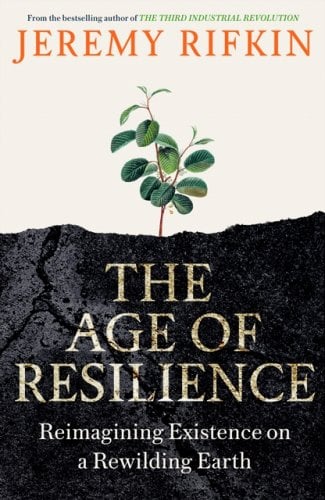
By Jeremy Williams
Jeremy Rifkin is a thinker with a reputation for being ahead of his time. The frequently discussed fear that digital technologies will make millions of workers obsolete? Rifkin wrote a book about that in 1995. The possibilities for hydrogen in a clean energy transition? See his 2002 book, two decades before the spate of recent national hydrogen plans. He’s also influential. His ideas around a ‘third industrial revolution‘ have been embedded in China’s five-year plans. He did some of the consultancy groundwork on what became President Biden’s infrastructure plan.

Whether this book will be as influential remains to be seen, because I suspect its conclusions will prove less welcome to global elites. In his latest book, Rifkin argues that “the Age of Progress has given way to the Age of Resilience.”
For centuries human civilisation has been driven by the idea of progress, reinforced through philosophy and particular interpretations of science. Prizing efficiency above all else, it has been locked in through the economics profession and political systems. But there are fundamental flaws to the progress paradigm right from the start. It never accounted for entropy and the laws of thermodynamics. Drawing on enlightenment philosophy and convenient readings of theology, the Age of Progress saw humanity as separate from and dominant over nature, which was treated as a resource to be exploited. That made industrial capitalism blind to the natural world. “The ‘real wealth’ upon which the entire life process depends, and without which the economic system would not exist, remains remarkably unconsidered among economists and business leaders.”
In a series of chapters, Rifkin roams across history to tell a story of enclosure as more and more elements of life were controlled and commodified. We’re used to thinking of enclosure in terms of land, but here we see how time, language, genes, or the magnetic spectrum, were all turned into resources that could be monetised, privatised and run through the lens of efficiency and profit. I liked this part of the book (not least because I wrote my university dissertation on the invention of clocks and the commodification of time), and it’s an unusual approach.
The idea of controlling and managing everything in order to maximise efficiency is unravelling in the face of challenges such as climate change or global pandemics. Movements such as ‘just in time’ manufacturing or ‘lean’ logistics suddenly look fragile rather than clever. Rifkin suggests that it’s time to rebalance, and “shift the focus of scientific enquiry from prediction to adaptation.” After all, “adaptation is the way every other species adjusts to the unpredictable changes in an ever-evolving world.”
We’d do better by seeing ourselves as deeply part of this ever-evolving world, rather than masterfully standing over it. The book beautifully describes the way that human bodies can be seen as a process as much as a ‘thing’ – all those atoms coming and going, growing and being replaced. All those bacteria and other micro-organisms that share our bodies and make us far more plural than we could ever grasp. Can we learn to create societies that flex with a changing world the nature does? The way our own bodies do? What would it look like?
If you’ve read any of Rifkin’s previous books, there are recurring themes and you may know what to expect. A greater role for empathy, a philosophical shift from ideals of individualist autonomy to interconnection and relationships. Connected and renewable-energy-powered ‘third industrial revolution’ economies. A localised bioregional government that can respond to immediate environmental priorities. Participative democracy.
As usual, much of what Rifkin imagines is a way off yet. “Our global society is beginning to exit the two-hundred-fifty-year span of the industrial revolution”, he writes. “We are witnessing an extraordinary leap into a new economic paradigm”, though we might not see it broadly recognised as such until “the mid-2040s”.
Rifkin won’t get everything right, working this far ahead. But that’s not the point. This is about understanding long-term trends, spotting patterns over centuries and asking new questions about the future. I found The Age of Resilience to be wide-ranging, thought-provoking, and generously optimistic about the future. Beyond a system based around dominance, exploitation and competing for personal gain, there’s the possibility of a kinder, greener society that values mutual flourishing.
First published in The Earthbound Report.
Categories: book review, economy, energy, International Politics, science, sustainability
Globally, fossil fuel subsidies are were $5.9 trillion or 6.8 percent of GDP in 2020 and are expected to increase to 7.4 percent of GDP in 2025 as the share of fuel consumption in emerging markets (where price gaps are generally larger) continues to climb. Just 8 percent of the 2020 subsidy reflects undercharging for supply costs (explicit subsidies) and 92 percent for undercharging for environmental costs and foregone consumption taxes (implicit subsidies).
This is straight off of the IMF web page
LikeLike